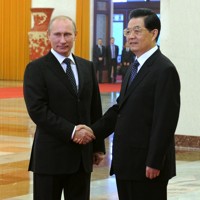One issue that warrants greater attention from Washington policymakers moving forward is how relations between Russia and China will affect those two countries’ policies relating to nuclear arms control. In particular, the next administration needs to consider how the U.S. government and other actors can help shape this evolving relationship so that it moves in benign directions, while hedging against possible adverse outcomes.
Russia and China have the world’s two most powerful militaries after that of the United States. China is currently undertaking perhaps the most comprehensive military modernization program in the world, while Russia still has approximately as much nuclear weapons capacity as the United States.
Although trilateral cooperation regarding nuclear nonproliferation has been strong in some cases, such as securing renewal of the Nuclear Nonproliferation Treaty (NPT), it has been inadequate in other instances, such as regarding Iran and North Korea, even though none of the three countries want to see the further spread of nuclear weapons.

